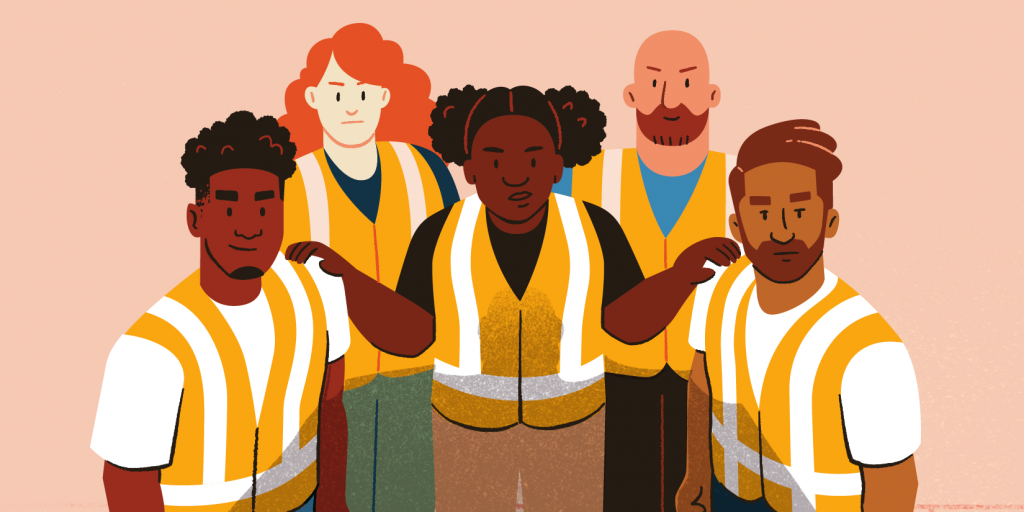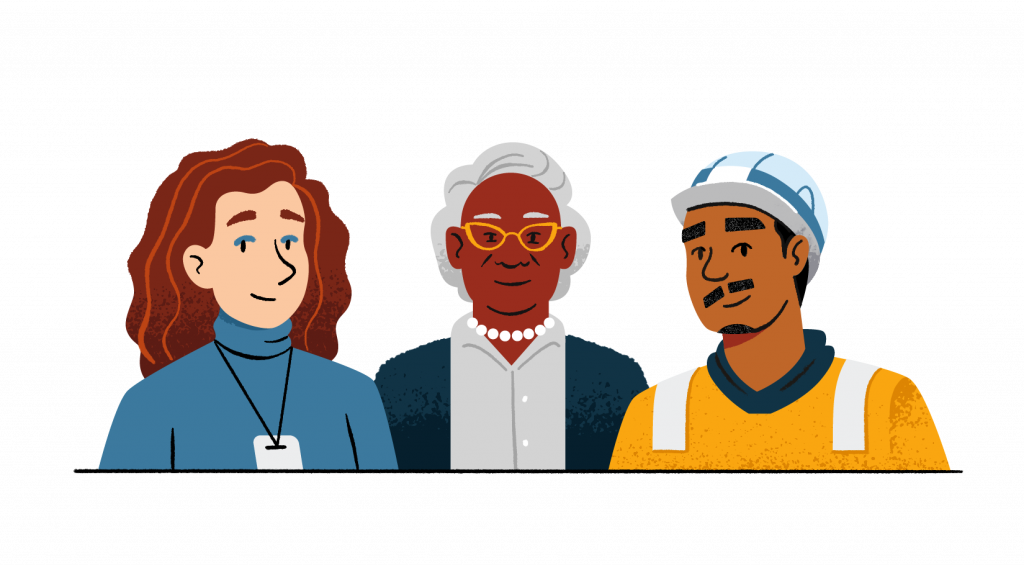Organizing is how we change the world.
There is power and safety in numbers, and when we come together with our co-workers we can win change at work.
If you’ve started organizing, you may have hit some big questions. Whether you are concerned about the legality of organizing at work or wondering what your rights are when you organize for any issue or a union drive, these questions can derail you and make even a conversation seem intimidating.
That is where this guide comes in. We’ve heard from many workers who have wondered and worried about the same questions. This guide covers a few important questions and topics we’ve come across in our work supporting thousands of workers just like you.

What Are the NLRA and the NLRB?
Passed in 1935, the NLRA, or National Labor Relations Act (also known as the Wagner Act), protects workers’ rights to unionize, bargain collectively, and strike. Before this, unions were often seen as criminal conspiracies. The NLRA also defined “unfair labor practices” and required employers to bargain in good faith. The National Labor Relations Board (NLRB) enforces it and generally cannot be overridden by local laws.
What Is Concerted Activity?
First of all: If you’re allowed to talk on the job about anything other than work, then talking on the job about your wages, conditions, or even about organizing a union is allowed, so long as you’re not taking unauthorized breaks to do so! If your campaign is not yet public, though, remember your boss and co-workers who are not supportive can overhear you at work.
According to section 7 of the NLRA: All workers that the NLRA covers have the right to participate in protected concerted activity, which it defines as two or more workers acting together to better their pay or working conditions.

What Does Concerted Activity Include?
Some examples of protected concerted activity include
- Workers circulating a petition asking for changes to working conditions, such as better hours or increased pay
- Workers joining together seeking to speak with their employer about workplace issues
- Workers speaking to each other about their wages, working conditions, or benefits, including discussion on social media (as long as it has relation to group action or attempts to bring a group complaint to the boss)
- A worker discussing workplace conditions on behalf of a larger group of co-workers
- Workers speaking to reporters regarding concerns or working conditions
What Does Concerted Activity not Include?
The NLRA does not protect concerted activity when workers make “maliciously false” or “deliberately offensive” claims against their employer. Complaints must be directly related to a labor issue, such as wages, safety, or benefits.
In certain instances an individual may act on behalf of a group, which the NLRA protects as concerted activity, but we recommend group activity always!
What Are Public-Sector Workers?
The NLRA excludes public-sector employees, as well as agricultural and domestic laborers, independent contractors, workers employed by a parent or spouse, and workers that are covered under the Railway Labor Act.
Public-sector employees work for government agencies, which are funded by tax dollars and provide public services rather than generate revenue. Ownership distinguishes the two sectors: If the employer listed on your paycheck is a government entity, you are a public-sector employee; if the employer listed on your pay check is an individual or non-governmental group (e.g., a sole proprietor, partnership, or LLC), you are a private-sector employee.
Laws protecting collective-bargaining rights of public-sector employees vary greatly by state.
What Is Right to Work?
Right-to-work laws prohibit requiring employees to join or pay dues or fees to a union in a unionized workplace as a condition of employment. Sixteen states currently have right-to-work laws.
What Is At-Will Employment?
In an at-will workplace, management can legally fire a worker at any time for any reason or no reason at all. This enables bosses to fire workers for almost any reason such as disliking a worker’s hair style or their attitude. Even in at-will workplaces, however, it is illegal to punish, threaten, or fire a worker for racist, sexist, or ageist reasons or for engaging in concerted activity.
Most workers in the U.S. who are not covered by union contracts are considered at-will employees. Currently, Montana is the only state that does not consider workers at-will. In Montana, after a probationary period, employers must have a valid reason for terminating an employee, and employees can only be fired for just cause.
What Is an Unfair Labor Practice?
An employer commits an unfair labor practice (ULP) anytime they violate a worker’s right to organize as described above. While ULPs can occur in unionized and non-unionized workplaces, this pamphlet focuses on workers organizing to form a new union.
The following are examples of ULPs that may occur before a union is established:
- Spying (or the impression of spying) on union-organizing activity, including conversations
- Making promises to workers to convince them to vote against unionization
- Threatening consequences like firing, worse working conditions, or store closures
- Improving or offering to improve working conditions during a union campaign in order to get workers to vote no
- Discriminating against employees for supporting unionization
For a longer list of examples, please see the United Auto Workers’ helpful document “How to Spot When the Boss May Be Breaking the Law.”
What Is Retaliation?
Retaliation is discipline from management against workers, such as deliberately reducing hours, assigning less pleasant work, or even firing the worker or closing the shop, simply for organizing. This is grounds for a ULP. Additionally, if the boss retaliates against an employee for filing a ULP, that retaliation is considered a ULP, regardless of the validity of the original complaint.

How Do I File a ULP?
Filing a ULP charge can be a tedious process, and a worker must file it within six months of the alleged offense. The NLRB recommends contacting the information officer at your regional NLRB office before filing your charge. You must submit any evidence and a list of witnesses alongside your charge.
Once you are ready to file a charge, you will mail this completed form to your regional NLRB office or submit it online using the NLRB’s e-file system and await contact from an agent assigned to your case. Here is a helpful diagram outlining what can happen after you file a charge.
The NLRB can make decisions like filing an injunction ordering the employer to stop the type of action under complaint or to reinstate or provide back pay to wrongfully fired employees.
When Should I File a ULP?
As organizers, we know that the boss has disproportionate power over us, and the justice system is not always fair or just. As a result, we must not overly rely on the ULP process to accomplish our goals. Filing ULP charges should be part of a broader organizing strategy where the desired goal is not dependent on the decision of the NLRB.
A ULP can be the subject of great conversations with co-workers. It is an opportunity to not only discuss the boss’s offense but also the limits of the legal system and the necessity of relying on each other rather than outside bodies.
What Are Weingarten Rights?
Weingarten rights allow private-sector workers, who have a legally recognized union, to have a steward or other union representative present in any meeting that could lead to discipline. Union workers in the public sector may have similar protections depending on labor law in their state or in their union contract. Weingarten rights do not apply to non-union employees due to a ruling by the NLRB in 2004.
If you are covered by Weingarten rights, ask your boss the following questions any time you feel you are being investigated (asked questions where your answers could lead to discipline) or you might be disciplined:
- “Will this meeting lead to discipline?”
- “Could my responses lead to discipline?”
If the answer is anything other than “no” (that includes “yes,” “maybe,” or “I don’t know”), assert your right to have a union representative present.
What Can I Do When My Boss Violates My Rights?
When employers violate your rights, organize!
The NLRA unfortunately has many limits. Labor law is not always on our side, and employers frequently violate the rights guaranteed to workers without facing punishment. Because of overburdened NLRB and state labor offices, workers often wait a long time before the board can process and enforce labor violations
As workers, we need to know our rights and how to assert them, but our best defense is having a large group of workers ready to take action to protect each other. Organize to build unity with your co-workers because we keep us safe.



